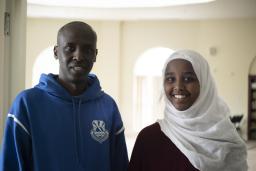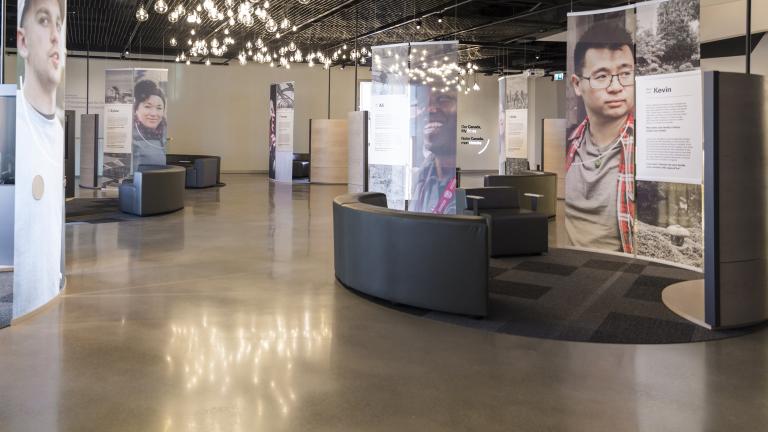Ali Duale knows what it’s like to be deprived of a community. In 1991, he and his wife fled a brutal civil war in Somalia, ending up in a Kenyan refugee camp where they spent seven years and had three children. After an ordeal he chooses to describe only as “a long process,” the family was eventually accepted into Canada as refugees.
From refugee to firefighter
Somali Canadian builds community through hope
By Maureen Fitzhenry
Published: May 28, 2020
Tags:
%20-%20credit%20Rob%20Vincent-CMHR.jpg?itok=8m2SXV7a)
Photo: CMHR, Rob Vincent
Story text
As his plane circled Halifax for that first landing, he looked down and could see only the snow. And it warmed his heart.
“It’s very hard to describe being a refugee and being nobody,” he says. “I remember being at a refugee camp and not having any documents or any ID or any belongings. I remember being nobody. And then becoming somebody.”
Ali worked hard to become a City of Halifax firefighter, a job he has held since 2004 – including a two‐year role as the fire department’s Diversity and Community Liaison Officer. Now a father of eight, he also coaches basketball and acts as an informal resource for new Canadians.
He has definitely become a “somebody” in his community: an advocate and organizer who helped build a swimming pool, a mosque and a community centre that also serves as a sports hub for kids and a gathering place for newcomers.
This country has given me a second chance in life. It is my intention to give back.
In 2020, during the COVID‐19 pandemic – often after a long night shift as a City of Halifax firefighter and first responder – Ali regularly loaded donated groceries into his car and delivered them to a half‐dozen neighbourhood families in need.

The pandemic not only expanded his role in the community, it helped him forge new bonds with his own family as well. Being socially isolated in a house with six children (two are grown and living in Ontario and Prince Edward Island), two grandchildren and his wife, was a revelation.
“It was so much better than I expected,” he says. “We became closer than ever before. We had more time to talk together and laugh and understand each other better. So this was a positive thing in that way, and it made me realize how much time I took away from my family, especially with my involvement with community issues which means being away from home.”
He also became a home‐school teacher and buddy to his two youngest boys, spending time playing in the wild area behind their home. Thankfully, the pandemic made his firefighter shifts a little easier as accidents and fires significantly decreased with people staying at home. And for that he is grateful.
%20-%20credit%20Rob%20Vincent-CMHR.jpg?itok=Aw25ohGv)
He points to the importance and power of community in how Nova Scotia responded to another trauma in 2020, when a shooter disguised as a Mountie ended the lives of 22 people.
“This had a huge impact for everyone in this province. This place is known as being peaceful and quiet and this incident has made people think of Nova Scotia in a different way. It was so sad to see that many people lost their lives for no reason. The whole province is grieving.”
“But I’ve seen some very positive things. In my neighbourhood, every second house had a Nova Scotia flag or a splash of blue. That made me feel good – the beauty of when we come together and stand together as a community.”
This mutual support and belonging matters most to Ali. It’s what he works to create every day. It’s why his story was featured in an exhibition at the Canadian Museum for Human Rights called Our Canada, My Story, which ran during 2017 for Canada 150, featuring seven remarkable Canadians working to overcome diverse human rights challenges.

In the video produced for that exhibition, Ali tries to explain: “Community is important to me because that’s the foundation of society. I’m very proud of being a Muslim and of being Canadian. This is the beauty of this country… we’re very multicultural, a very diverse community. Being Canadian is being who you are – there’s no contradiction…. This was my destiny – to give back to this community and to this country.”
%20-%20credit%20Rob%20Vincent-CMHR.jpg?itok=wiamXo0K)
If there has been racism and hardship in Canada for a Black Muslim newcomer from Africa, it’s not something that you’ll hear from Ali. He’d rather focus on the good.
Like receiving a personal phone call from Prime Minister Justin Trudeau in 2017 to thank him after his story gained national attention from media coverage of the Our Canada, My Story exhibition. Ali has since spoken to the Prime Minister twice more at public events.
Like attending the unveiling of the new $10 bill featuring Black Nova Scotian human rights defender Viola Desmond on one side and the Museum on the other – an invitation he received from the Bank of Canada.
Like hearing the outdoor call to sunset prayer during Ramadan for the very first time since arriving in Canada. The City of Halifax permitted the call to be broadcast in the spring of 2020 because Muslims could not gather during the COVID‐19 pandemic. It’s a practice that Ali hopes will continue.
“This is a thing I could never have imagined, that this could happen here. It made me feel so good.”
But for Ali, it’s all part of a natural process. To him, it’s the inevitable result of putting hope and human rights into action.
“I cherish action. The action creates conversation, the conversation creates understanding and the understanding creates harmony. I’m always optimistic that the outcomes will be positive.”
Being Canadian is being who you are – there’s no contradiction.
Ask yourself:
What are my attitudes towards newcomers in Canada?
How can helping my community promote human rights in the world?
How can I help make a difference in my community during difficult times?
Suggested citation
Suggested citation : Maureen Fitzhenry. “From refugee to firefighter.” Canadian Museum for Human Rights. Published May 28, 2020. https://humanrights.ca/story/refugee-firefighter